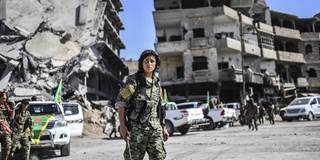When US-backed rebels took the ISIS stronghold of Raqqa last month, Syrian fighters leading the charge vowed to return the city to its people. But one Raqqa native, a victim of past purges, worries that his city has simply passed from control by "bearded fanatics" to that of Kurdish and international forces.
BERLIN – In mid-October, the Syrian Democratic Forces, a US-backed, predominantly Kurdish militia with ties to the Kurdistan Workers’ Party (PKK) in Turkey, “liberated” my hometown, Raqqa, from Islamic State (ISIS) fighters. Arabs, a majority of the region’s population, had little to do with ISIS’s ouster. In a city where locals have long been relegated to second-class status, the triumph of the Democratic Union Party (PYD) – the Syrian branch of the PKK – has kindled fears that history is repeating.
Activists from Raqqa have long referred to our dilapidated city as an “internal colony,” owing to its long history of economic, political, and social marginalization at the hands of Syrian governments. In the early 1970s, Raqqa – then small and poor – was nonetheless moving forward and flourishing. Schools were multiplying as attendance surged. Other public services were improving as well, and parents believed that their children would lead more prosperous lives than they and previous generations had.
This was certainly true of my parents, who sacrificed a lot to raise their nine children. They were not happy when, in the 1970s, their older sons became communists, strongly opposing the brutal regime of Hafez al-Assad, President Bashar al-Assad’s father. But this was not a farfetched transformation in a city where people were assuming new identities – such as Nasserist, Baathist, Islamist, or communist – downplaying their regional and tribal origins.

BERLIN – In mid-October, the Syrian Democratic Forces, a US-backed, predominantly Kurdish militia with ties to the Kurdistan Workers’ Party (PKK) in Turkey, “liberated” my hometown, Raqqa, from Islamic State (ISIS) fighters. Arabs, a majority of the region’s population, had little to do with ISIS’s ouster. In a city where locals have long been relegated to second-class status, the triumph of the Democratic Union Party (PYD) – the Syrian branch of the PKK – has kindled fears that history is repeating.
Activists from Raqqa have long referred to our dilapidated city as an “internal colony,” owing to its long history of economic, political, and social marginalization at the hands of Syrian governments. In the early 1970s, Raqqa – then small and poor – was nonetheless moving forward and flourishing. Schools were multiplying as attendance surged. Other public services were improving as well, and parents believed that their children would lead more prosperous lives than they and previous generations had.
This was certainly true of my parents, who sacrificed a lot to raise their nine children. They were not happy when, in the 1970s, their older sons became communists, strongly opposing the brutal regime of Hafez al-Assad, President Bashar al-Assad’s father. But this was not a farfetched transformation in a city where people were assuming new identities – such as Nasserist, Baathist, Islamist, or communist – downplaying their regional and tribal origins.